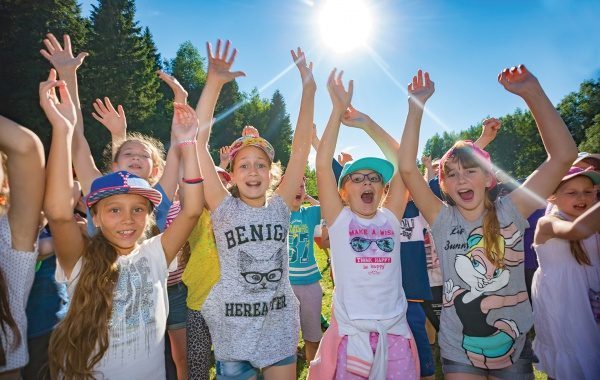If your kids are like their peers, they’re spending almost half of their waking hours on technology – about six hours a day for 8- to 12-year-olds, according to Common Sense Media.
“We are raising a generation of children who are the most connected ever because of smart phones, yet they’re the least connected in terms of real social connections,” says Andy Pritikin, owner and director of Liberty Lake Day Camp in Bordentown.
Since most camps tell campers to leave their cell phones, iPads, computers and videogames at home, kids have to find other ways to entertain themselves. And without Siri or Google answering questions in an instant, they begin solving problems independently, thinking and reasoning on their own.
“Camp is a step back in time where kids get to live and function socially the way humans did for thousands of years, up until about 12 years ago,” Pritikin says.
Ellen Lowenberger sends her two kids – Andrew, 15, and Mara, 8, – to the JCC Camps at Medford each summer. She has seen firsthand the benefits of unplugging for the summer.
“In school they use their iPads all the time,” says the Voorhees mom. “Their faces are in front of the screen so much they don’t get that interaction with people. They don’t know how to socialize the right way. At camp, they have to be able to talk to people.”
“These are 21st Century skills that are lacking,” adds Pritikin. “At camp, you are on your own and you’re forced to collaborate and communicate with other people without parental supervision.”
Lowenberger has also seen her kids enjoying the outdoors – something they rarely do outside of camp.
“They’re not sitting around being bored,” she says. “They are out there learning, making new friends, and they grow not only physically, but mentally and emotionally because they’re not sitting around doing the same things. Being outdoors helps with that experience.”
Sara Sideman, associate director of the JCC Camps at Medford, stresses the importance of experiencing nature. “Kids’ activities are pretty tied to being indoors these days, but fresh air and sunshine are vital,” she says. At her camp, kids learn
how to keep the land and water clean, plus they help care for the animals in the camp’s petting zoo.
In fact, one summer Mara lobbied her parents to adopt an Alpaca as a pet.
“I heard about the animal’s poop – the little blueberries all over the place – and what it feels like when their tongue touches your hand – how it tickles,” says Lowenberger, noting that Mara’s argument,while compelling, did not convince her parents to take in an Alpaca.
It’s also pretty typical for kids to learn how to swim at camp.
“It’s one of the most important things we teach our campers,” Sideman says. “Our kids swim twice a day.”
For Mara, learning to swim was something she did not look forward to, because she was afraid of the water. But with the help of the swim instructors, she was able to overcome the fear, and she now swims.
“Through coaching, watching her peers and the staff working with her to help her feel confident, she’s now comfortable in the pool,” Sideman says.
Learning new things, even when you’re afraid, is something that happens pretty regularly at camp – and that’s a good thing.
“It can be as simple as creating a new kind of art project, sitting next to a new friend at lunch or pushing outside of your comfort zone to climb the rock wall,” says Sideman. “It’s pushing yourself to go beyond the boundaries you thought you were capable of.”
“Camp is set up in ways that allow children to tackle real-life challenges in a safe, controlled setting,” Pritikin adds. “They learn the skills to become the kind of successful adults who can make tough decisions and push themselves through challenging situations.”
Camp, Pritikin says, can also foster independence.
“Camp is a first step to cutting that umbilical cord,” says Pritikin. Campers can learn resilience, patience, how to compromise, keep their emotions in check and make decisions on their own. And parents can rest easy knowing their kids are safe.”
Unlike a structured school environment, camp allows kids to grow with the program, says Sideman.
“A program for a 3-year-old is very different than one for an 8-year-old or a 13-year-old, because we want the kids to grow in independence.” For example, she says, a counselor will help a toddler pack up her swim bag, but supervise an 8-year-old doing it herself.
As campers get older, they grow socially and emotionally. “Frequently kids are put into bunks with kids they don’t know, spending many hours a day together,” says Sideman. “That bunk community and family is vital for social growth. And we know how a wonderful counselor can help a child grow and feel more confident.”
Counselors often take on a temporary parenting role, and campers typically respect and admire them.
“My son, being the person who he is, with autism, is not a very social person,” says Lowenberger. “He likes to do things one on one. At camp he was forced to do things as a group and to trust other people and himself.”
Lowenberger still marvels at the video she watched of Andrew scoring a home run at kickball several years ago. “My son has never been one to gravitate toward sports,” she says. “Every time that video appears on my timeline – of him running the bases and scoring the home run, whether it was assisted by the counselors or not – it just means so much because I never, ever thought that’s something he would enjoy doing.”
Now, Andrew enjoys playing volleyball, and often assists other kids. Next year he will enter camp’s leadership-in-training program.
“The typical default setting for kids is not to leave their comfort zone, especially when they get up toward middle school, because they don’t want to look bad,” Pritikin says.
“At camp,” he adds, “kids are given the opportunity to try new things and that can change the default mental framework of a person, and make them more open to try new things in life.”














